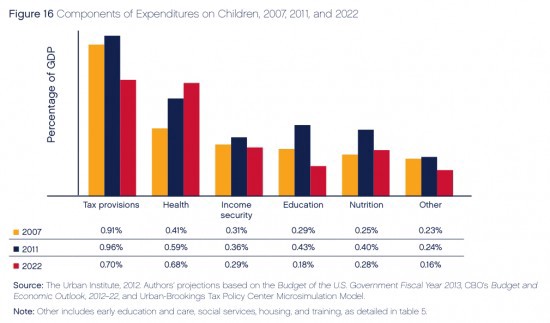Republicans often portray reducing the debt — which they insist must be done entirely through spending cuts — as a matter of principle as well as good policy. “In my view, it’s not just bad economics,” GOP presidential candidate Mitt Romney said in August. “It is immoral for us to pass these burdens on to coming generations.”
But a new report from the Urban Institute, flagged today in The New York Times, found that spending and tax exemptions that protect children from poverty and invest in their future will decline from 3 to 2.3 percent of the economy by 2022 — largely as a result of attempts to reduce the debt.
Much of the effect is due to the exhaustion of the 2009 stimulus combined with the spending caps imposed by the Budget Control Act of 2011, which averted the debt ceiling crisis. Some elements of support for children were exempted from the BCA, particular health care programs and income support. But other areas such as tax provisions, education, and nutrition support will see a significant hit, as this chart shows:

And this is merely spending paths as they currently stand. Half of the BCA’s cuts over the next decade fall on the military. Republicans are becoming ever more adamant about sparing the Pentagon from those reductions, and shifting them over to other agencies. Their plan would further reduce the support children receive in the coming years, most notably through a series of deep cuts to the food stamp program.
And on top of that, the budget plan proposed by Romney requires cutting everything that isn’t Medicare, Social Security and defense by 40 percent by 2016. This would level even greater cuts on the programs already hit by the BCA, as well as the spending the BCA passed over — all while leaving programs for the elderly effectively untouched.
The irony should be obvious: In the name of reducing the debt burden on our children, Mitt Romney and the Republicans would decimate the programs that provide those same children with the investments, opportunities, and support to grow into productive adults able to take on future challenges.
